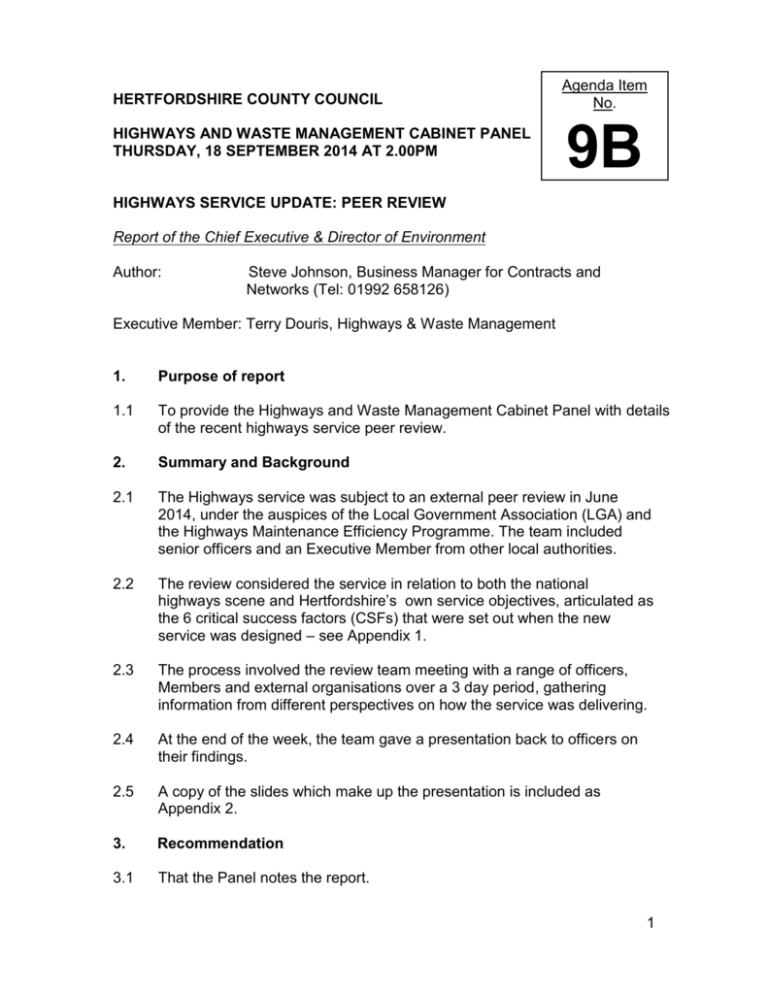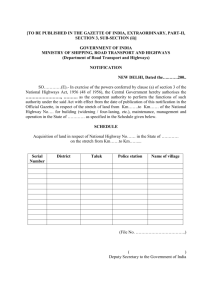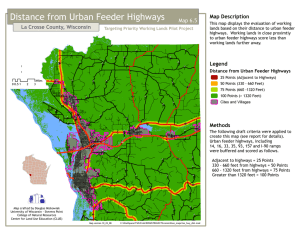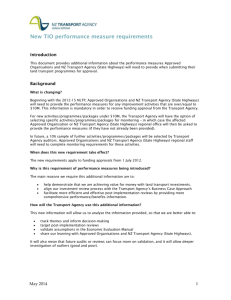highways service update: peer review
advertisement

HERTFORDSHIRE COUNTY COUNCIL HIGHWAYS AND WASTE MANAGEMENT CABINET PANEL THURSDAY, 18 SEPTEMBER 2014 AT 2.00PM HIGHWAYS SERVICE UPDATE: PEER REVIEW Report of the Chief Executive & Director of Environment Author: Agenda Item No. 9B 4 Steve Johnson, Business Manager for Contracts and Networks (Tel: 01992 658126) Executive Member: Terry Douris, Highways & Waste Management 1. Purpose of report 1.1 To provide the Highways and Waste Management Cabinet Panel with details of the recent highways service peer review. 2. Summary and Background 2.1 The Highways service was subject to an external peer review in June 2014, under the auspices of the Local Government Association (LGA) and the Highways Maintenance Efficiency Programme. The team included senior officers and an Executive Member from other local authorities. 2.2 The review considered the service in relation to both the national highways scene and Hertfordshire’s own service objectives, articulated as the 6 critical success factors (CSFs) that were set out when the new service was designed – see Appendix 1. 2.3 The process involved the review team meeting with a range of officers, Members and external organisations over a 3 day period, gathering information from different perspectives on how the service was delivering. 2.4 At the end of the week, the team gave a presentation back to officers on their findings. 2.5 A copy of the slides which make up the presentation is included as Appendix 2. 3. Recommendation 3.1 That the Panel notes the report. 1 4. Peer Review Findings 4.1 The team noted that at 25% revenue savings the service is ahead of the 20% target set out in the CSF and has met a further CSF by the service having 41% less county council employed staff. The team went on to consider the service within the context of the remaining factors, which include “performance & risk management”, “service flexibility”, “managing customer expectations” and “effective & compatible systems.” 4.2 The team identified a number of positives within the service, but at the same time highlighted some areas for future consideration. 4.3 The team felt that Hertfordshire’s approach was very brave and that it has a strong, ambitious, customer focused organisation with strong political and managerial leadership, talented staff and a desire for continuous improvement. 4,.3 Within a national context they highlighted some particular areas of “notable practice”: Highways Locality Budgets (HLB) as a way of making Localism mean something real; The efforts the service makes to engage with its stakeholders; The importance the service gives to communication – though the service has more to do around satisfying people with the first message provided to them; The Whole Client Service between the County Council and Opus Arup; The way so many staff understand Members’ objectives for the service, and put them into effect with a passion for good service. 4.5 They also identified 3 main areas for the service to consider further. These were: Ensure the improvement action plan includes improvements to the systems that underlie services and contracts – especially the HST (Ringway) services and contract. Focus on the future, making the service’s contractual relationships deliver what the service needs. 2 Manage expectations. They suggest that the service may need to reduce the way its desire to help people creates yet further demand on the service. 4.6 The outputs from the peer review are being included within the ongoing Highways service development programme and action plans. 5. Financial Implications 5.1 There are no financial implications arising from this report. Background Information None 3 APPENDIX 1 Critical Success Factors The six Critical Success Factors agreed by Cabinet on 19/7/2010 were: No. Description Weight 1 Fundamental 2 3 4 5 6 The new arrangements must be capable of achieving 20% revenue savings by 2013/14 (relative to 09/10) and meet future financial targets in a sustainable way focused on value for money. Ongoing competition for Capital works will be used to drive down costs. The new arrangements will have fewer HCC employees at less cost (properly taking into account payments to service providers). The new arrangements will include effective performance management, incentivisation and risk management to drive service quality in key areas, specifically including public satisfaction. The new arrangements must be flexible and allow for changes in scope, scale, strategic goals (e.g. Herts Local) and operational priorities for the duration of the contract and beyond. The service will strive to meet and manage customer expectations reliably and in a controlled manner. The new arrangements will include effective/compatible systems and processes that support the business and a seamless customer interaction. Advantageous Fundamental Important Important Important 4 APPENDIX 2 Highways Service Peer Review – Feedback presentation June 2014 5








